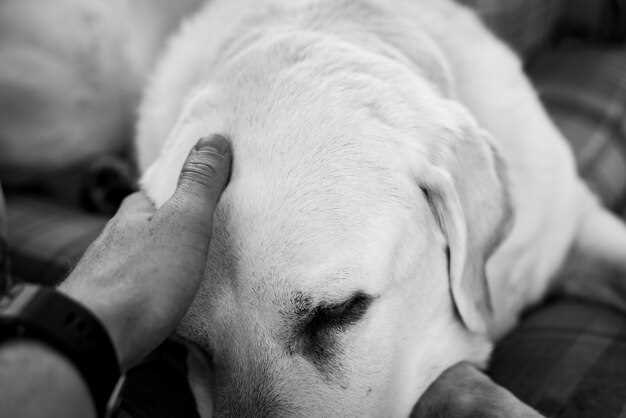Finding Grieving Support After Pet Loss – Resources and Strategies
Join a pet loss support group. Connecting with individuals who share similar feelings can significantly ease the grieving process. Consider local community resources, such as veterinary offices or animal shelters, which often provide information about support groups tailored to pet loss. Online forums and social media groups also serve as valuable spaces where you can share your experiences and find comfort.
Utilize hotlines specifically dedicated to pet loss. Organizations like the ASPCA and the Pet Loss Support Hotline offer compassionate listening and guidance for those navigating grief. Speaking with someone who understands can bring solace and clarity, helping you to process your emotions without judgment.
Honor your pet’s memory through creative expression. Engage in activities such as writing a tribute, creating a scrapbook, or planting a memorial garden. These actions foster a personal connection and provide a meaningful outlet for your feelings. Keeping a journal can also assist in articulating your grief and tracking your healing process over time.
Seek professional help if needed. A therapist or counselor experienced in pet loss can provide tailored support and coping strategies. Grief is a complex emotion, and having a trained professional to discuss your feelings with can make a significant difference in navigating this challenging time.
Engage in self-care practices. Prioritize your well-being through activities that nurture your body and mind. Regular exercise, meditation, and maintaining a healthy routine contribute to emotional resilience. Surround yourself with supportive friends and family who understand your loss and can provide comfort during difficult moments.
Understanding the Grieving Process after Losing a Pet

Accept the reality of loss. Recognize that grieving for a pet is a natural response to love and companionship. Allow yourself to feel emotions fully, whether it’s sadness, anger, or confusion. Don’t rush this process; it takes time.
Utilize available resources for emotional support:
- Join pet loss support groups, either online or in-person, where you can share experiences and feelings.
- Consider pet loss hotlines. Speaking to someone trained in this specific grief can provide immediate comfort.
- Seek professional counseling. A therapist can help navigate complex feelings and provide coping strategies.
Memorialize your pet. Creating a tribute can aid in processing grief:
- Make a scrapbook or photo album to celebrate memories.
- Plant a tree or a garden in their honor.
- Hold a small memorial service with family and friends to share stories.
Establish daily routines to help reintroduce structure. Routine can create stability during chaotic emotions:
- Set a schedule that includes self-care and activities you enjoy.
- Incorporate physical activity; walking or exercising can boost mood.
- Try journaling your thoughts and feelings–it can provide clarity.
Be patient with yourself. Grief can resurface unexpectedly, even long after the loss. Recognize special days, like birthdays, and allow yourself to grieve anew if needed. Each step you take toward healing is valuable.
Connect with the memories of your pet. Cherish the bond you shared, knowing that love doesn’t disappear with loss. Talk to others about your experiences and feelings, as sharing can lighten the emotional load.
Identify triggers that stir grief. Whether it’s seeing their food bowl or visiting favorite parks, acknowledge how these moments affect your emotions. Plan ahead to either embrace or manage these triggers.
Consider adopting another pet when you feel ready. This decision often leads to joy and companionship again, but only proceed when you believe you can open your heart once more.
Identifying Personal Needs: What Kind of Support is Right for You?

Assess your emotional state after the loss of your pet. Decide if you need someone to listen, a group to connect with, or professional help. An honest evaluation of your feelings aids in choosing the right path forward.
Consider the type of support that resonates with you. Some people prefer one-on-one conversations with friends or family, while others benefit from group discussions. Think about how much interaction you desire.
Reflect on whether you seek emotional comfort or practical advice. If sharing memories feels therapeutic, informal gatherings with other pet owners may suit you. However, if you need coping strategies, professional counseling might be beneficial.
Evaluate your comfort with expressing grief. If opening up to close friends feels daunting, a support group or online forum can offer a space for sharing without pressure. Alternatively, journal your feelings as a private outlet.
Differentiate between immediate and long-term support needs. Initially, you may need comfort and companionship. Over time, focus on ways to honor your pet’s memory or engage in healing activities.
| Type of Support | Benefits | Considerations |
|---|---|---|
| Friends and Family | Personal connection and familiarity | May lack understanding of pet loss |
| Support Groups | Shared experiences and validation | Group dynamics may vary |
| Professional Counseling | Structured support and strategies | Cost and availability of services |
| Online Communities | Access to a broader network | Lack of personal connection |
| Journaling | Private expression of feelings | Self-discipline required |
Identify which options feel most accessible and appealing. The right support can facilitate healing. Reassess your needs over time, adapting your choices to align with your emotional journey.
Local Support Groups and Community Resources

Join a local support group specific to pet loss in your area. Many veterinary clinics and animal shelters organize regular meetings where people share their feelings and experiences. This connection can provide comfort and understanding.
Finding Groups Near You
Search for local support groups using platforms like Meetup or Facebook Events. Many of these groups are open to all, creating a welcoming atmosphere. Consider contacting nearby animal welfare organizations; they often have resources dedicated to grieving pet owners.
Community Resources
Explore community centers that host grief counseling sessions. Trained professionals can guide discussions and help individuals process their emotions. Additionally, checking with local hospitals or mental health clinics may lead you to specialized pet loss counseling services.
Many places also offer online forums and helplines that connect you with trained counselors. Utilize these resources to gain insights and strategies for coping with the loss. Sharing your story can lighten the emotional burden and help you find healing.
Don’t hesitate to ask your veterinarian for recommendations. They often have connections within the community and can point you toward helpful resources. Creating a support network can be a vital step toward healing.
Online Support Communities for Pet Loss
Join forums like “Pet Loss Support” which offers a space to share experiences and feelings with those who understand your grief. These communities provide a platform for open discussions, allowing you to connect over shared loss.
Explore Facebook groups dedicated to pet loss support. Many are private, ensuring a safe environment to express your emotions. Search for groups like “Rainbow Bridge Pet Loss Support” to find compassionate members sharing their own stories.
Visit specialized websites such as “Rainbow Bridge” and “Pet Loss Help” which offer articles, resources, and community forums. These sites often feature support hotlines and chat options for immediate assistance.
Consider joining online therapy platforms that focus on pet loss counseling. Many licensed therapists specialize in grief related to pets, offering personalized support in a convenient format.
Engage with local animal shelters or veterinary offices that may offer virtual support groups. These often provide avenues to talk with others who recently experienced similar losses, creating a comforting sense of community.
Use social media to connect with influencers and authors who discuss pet loss. Following their content can help you feel less isolated, as they share personal stories and coping strategies.
Explore websites and apps that provide journaling prompts or meditation focused on grief. These tools can complement community support by helping you process your emotions individually.
Participate in online memorial services or tribute pages for pets. This act of remembrance can be healing and allows others to offer condolences and share their own tributes.
These online spaces not only provide support but also foster a deeper understanding of shared grief. Engaging with others can lighten the heavy burden of loss.
Professional Counseling: When to Seek Help
If feelings of grief become overwhelming, it’s time to consider professional counseling. Look for signs such as persistent sadness, loss of interest in daily activities, or difficulty functioning at work or home. If you find yourself isolating from friends and family, or if your grief interferes with your ability to care for yourself, reaching out to a counselor can provide valuable support.
Therapists specializing in grief counseling can help you process your emotions and develop coping strategies. Seeking support from professionals can be particularly beneficial if you experience complicated grief, where the pain feels never-ending or excessively intense. They can guide you in understanding and expressing your feelings, helping you find a way to honor your pet’s memory without being consumed by sorrow.
Consider scheduling a session if you notice that your grief impacts your physical health, resulting in sleep disturbances or changes in appetite. A counselor can assist you in addressing these issues and working towards healing.
Many professionals use techniques like cognitive-behavioral therapy (CBT) or mindfulness exercises, focusing on practical steps to manage grief. Don’t hesitate to reach out; seeking help is a proactive step towards recovery and can lead to a healthier way to remember your beloved pet.
Creating a Memorial or Tribute for Your Pet
Craft a memorial space in your garden or home to honor your pet. Choose a quiet spot, then add items that remind you of your pet, like their favorite toys, photographs, or a special plant. Consider engraving a stone with your pet’s name and a meaningful date.
Consider making a scrapbook that chronicles treasured moments shared with your pet. Include photos, anecdotes, and notes about their personality. This visually engages your memories and emphasizes the joyful times.
Host a small gathering of friends and family who shared a bond with your pet. Sharing stories, memories, and laughter can create a supportive environment where everyone can express their feelings. You might include a ritual, like lighting candles or sharing a toast in their memory.
Explore the idea of creating a personalized piece of art. Commission a painting or sketch, or take a DIY approach and create a mural. Art can be a powerful way to capture your pet’s spirit and keep their memory alive.
Look into planting a tree or a flower garden in your pet’s honor. As you nurture this living tribute, it can symbolize the love you shared and offer a place for reflection and remembrance.
Write a letter to your pet expressing your love and gratitude. This personal touch helps process emotions and serves as a keepsake you can revisit whenever needed. Consider placing it in your memorial space or reading it aloud during a tribute gathering.
Finally, share your experience on social media or pet loss support groups. Connect with others to exchange stories and resources, fostering a community that understands your grief. This connection can be incredibly uplifting as you cherish the legacy of your beloved pet.
Books and Articles for Coping with Pet Loss
Consider reading “Goodbye, Dear Friend” by Gary Kowalski. This book offers thoughtful insights and comforting perspectives on losing a pet. It helps readers process grief through reflection and healing practices.
Recommended Books
- “The Loss of a Pet” by Wallace Sife: This guide provides support and coping strategies specifically designed for pet owners, including resources for emotional healing.
- “Healing Your Grieving Heart for Pets” by Alan D. Wolfelt: Written with compassion, this book helps readers navigate the sadness of losing a furry friend.
- “Goodbye, My Friend” by Joan C. McClain: A beautifully illustrated book that addresses the emotional bond between pets and their owners, offering consolation and understanding.
Articles and Online Resources
- The Association for Pet Loss and Bereavement: Offers articles, chat rooms, and online support tailored for individuals coping with pet loss.
- ASPCA Grief Support: Features helpful articles focused on understanding grief and finding ways to cope after losing a pet.
- Veterinary Clinics: Many veterinary clinics publish grief resources and articles on their websites that guide owners through bereavement.
Engaging with these resources can provide comfort and validation during this difficult time. They offer both practical advice and emotional support, making it easier to cope with the loss of a beloved pet.
Practicing Self-Care During Your Grieving Journey
Prioritize daily rituals that bring comfort. Walking your dog, sipping tea, or journaling can provide a soothing routine that stabilizes emotions. Each small act can help ground you after the loss.
Connect with nature. Spend time outdoors, whether in a park or your backyard. Nature offers a healing environment that encourages reflection and tranquility. Let the sights and sounds help process feelings of grief.
Engage in Creative Expression
Explore creative outlets like painting, writing, or music. These activities offer a safe space to express complex emotions. Creating something can be therapeutic, allowing you to articulate what words alone may fail to convey.
Maintain Physical Health
Pay attention to your physical health. Regular exercise, balanced meals, and adequate sleep support emotional well-being. Simple practices, like going for a daily walk or preparing a nutritious meal, can enhance your mood and energy levels.
Seek connections with others. Reach out to friends or family members who understand your loss. Share stories or simply be together. Participating in support groups can also create a sense of community, reducing feelings of isolation.
Video:
Why Pet Loss is a Heavy Grief
Why Pet Loss is a Heavy Grief by Jo McRogers Grief Support That Works 42,359 views 2 years ago 8 minutes, 3 seconds
Q&A:
What are some common feelings people experience after losing a pet?
After a pet loss, many individuals go through a range of emotions, including sadness, anger, guilt, and even relief. These feelings can vary greatly and may change from day to day. Some might feel a profound sense of loneliness, as pets often provide companionship and unconditional love. It’s important to acknowledge these emotions and understand that grieving is a personal process that looks different for everyone.
What support resources are available for those grieving the loss of a pet?
There are various resources available for grieving pet owners. Many veterinary clinics offer grief counseling services or can refer individuals to support groups. Online forums and social media platforms also provide spaces for people to share their experiences and seek advice. Additionally, there are books and websites dedicated to pet loss that can offer comfort and guidance. Some communities even have local support groups where individuals can meet and share their feelings face-to-face.
How can I memorialize my pet after their passing?
Creating a memorial for your pet can be a meaningful way to honor their memory. You could consider planting a tree or flower in their memory, creating a scrapbook with photos and memories, or even commissioning a piece of art that represents your pet. Other options include creating a memory box filled with their belongings or having their paw print made into a keepsake. These memorials can provide comfort and a way to celebrate the joy your pet brought into your life.
Is it normal to seek professional help after losing a pet?
Yes, it is completely normal to seek professional help after experiencing the loss of a pet. Grief can be overwhelming, and talking to a therapist or counselor who specializes in pet loss can provide valuable support. These professionals can help individuals process their emotions, cope with their grief, and find healthy ways to remember and honor their pets. Reaching out for help is a sign of strength and can lead to healing and understanding.
What coping strategies can I use to deal with pet loss?
Coping with pet loss can be challenging, but there are several strategies that can help. Firstly, allow yourself to grieve and don’t rush the process. Journaling your feelings can provide an outlet for your emotions. Engaging in rituals, such as lighting a candle or creating a tribute, may also aid in healing. Connecting with others who have experienced similar losses can be comforting; whether through support groups or online communities, sharing your story can help you feel less isolated. Lastly, consider adopting another pet when you feel ready, as this can bring joy back to your life.
